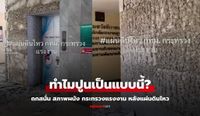In a significant turn of events, social media has erupted in criticism following a series of images posted by a user on X, highlighting the substandard construction of the Ministry of Labor building in Thailand. This comes in the wake of a 7.7 magnitude earthquake that struck Bangkok on the morning of March 29, 2025, causing tiles from the building's walls to crash to the ground and exposing poorly applied plaster work. The user expressed their disbelief at the state of the building, questioning how it passed inspection, saying, "It's already exposed! The condition of the road is worrying, causing trouble. Why is this style of pothole not completely filled?"
The shocking images showed cracked walls and fallen tiles, sparking a flurry of comments from netizens concerned about the quality of construction. One user humorously noted, "Looking on the bright side, this building is flexible enough to withstand earthquakes, except the rigid tiles fell off first!" Another user lamented, "This is typical of Thai contractors; when building for private firms, they adhere to standards, but government projects often cut corners, leading to subpar work."
In a follow-up investigation, reporters found that proper tile installation requires adhesive to cover the entire surface to ensure a strong bond and prevent future issues like tiles falling off. The correct method involves cleaning the wall, mixing the adhesive according to package instructions, and applying it evenly. These steps are crucial for a durable installation that withstands environmental challenges.
Construction quality issues in Thailand are not new. A report from Project Sabai on September 23, 2024, highlighted ongoing problems in the construction industry, including unqualified labor and the use of inferior materials. The report emphasized the need for clients to select experienced contractors who understand local regulations to ensure compliance with international standards.
In response to the earthquake and the public outcry, the Thai Ministry of Interior had introduced new regulations on September 6, 2023, aimed at improving safety and sustainability in construction. These regulations focus on load-bearing capabilities, fire resistance, and the use of environmentally friendly materials, as well as designs that can withstand natural disasters like earthquakes. According to Legal500, these measures are intended to reduce accident risks and elevate building quality in Thailand.
Despite these regulations, the recent earthquake incident has ignited calls for urgent inspections and actions from relevant authorities to prevent future risks, particularly in public buildings heavily used by citizens. Many netizens have questioned the inspection processes of government projects, demanding a thorough investigation into the contractors responsible for the Ministry of Labor building.
In a heartwarming counter-narrative, another incident emerged on the same day, when a TikTok user known as @_taviboom shared a video of a kind-hearted man who provided free transportation during the earthquake crisis. With many commuters stranded, particularly those needing to travel from Chidlom to Samrong, this man parked his van and offered rides to anyone heading in that direction. The user's post captured the moment, stating, "In the midst of an earthquake and bad events, there are still good things happening. Many people had to walk back because there were no cars, but this man said, 'Anyone going to Samrong, free service, get in the car.' Hearing that made me tear up. We truly are in a time when people need to look out for each other."
The video quickly gained traction, with viewers praising the driver's generosity. Comments flooded in, expressing sentiments like, "That man has a big heart; I almost cried watching this from Chiang Mai," and "I'm grateful to be Thai; may everyone be safe and prosperous."
The Facebook page BKKWheels also shared a photo of the van, stating, "Regardless of who owns this van, may the good deeds you’ve done come back to you in beautiful ways. Thank you for thinking of others and for your selflessness." This incident serves as a testament to the spirit of kindness among Thais, even in times of crisis, reflecting the saying, "Thais do not abandon each other."
As the day unfolded, the juxtaposition of the construction quality issues and the acts of kindness highlighted the complexities of Thai society. While the earthquake exposed significant flaws in infrastructure and raised questions about regulatory oversight, it simultaneously showcased the resilience and compassion of the people. This duality invites a broader discussion on how to balance development with safety and community support.
In conclusion, the events of March 29, 2025, illustrate both the challenges and strengths within Thai society. The earthquake not only revealed the urgent need for improved construction standards but also highlighted the incredible human spirit that shines through in times of adversity. As citizens call for accountability and better practices in construction, they also reaffirm their commitment to supporting one another, showcasing the best of what it means to be part of a community.





